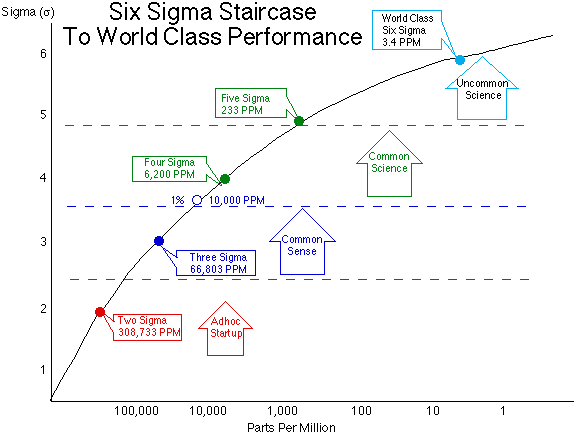What is Six Sigma?

- 2.5 Sigma (150,000 parts per million):
- Startup companies often cobble processes together without regard to the costs. These adhoc processes often have error rates of 15% or more which result in enormous "fixit" costs.
- 3.5 Sigma (10,000 PPM):
- Profitable existing companies often reach 1-3% through plain common sense, but rarely rise above this level. And if ordering, fulfilling, and billing all have 1% or higher error rates, the customer experiences a 6% or higher error rate on each transaction. There are enormous costs associated with fixing these defects—handling customer calls, warranty and replacement costs, and so on.
- 5 Sigma (233 PPM):
- You can reach the next plateau in 18-24 months using what I callcommon science: First: focus on the 4% of your business that creates over 50% of the waste and rework using line and pareto charts. The analyze the root causes and initiate improvements. Then use common control charts to sustain the improvement. You minimize your costs while maximizing your benefit.
- 6 Sigma (3.4 PPM):
- To reach this higher level, you'll need some uncommon science: like QFD, DOE, and other, more advanced, improvement tools. When you reach 5 sigma you'll have the money, track record, and motivation to invest in learning and applying these tools, but it would probably be a waste of time and money to learn these tools at 3 sigma. You just don't need them to make breakthrough improvements.
Where are you on this Six Sigma Scale?
- If you've been in business for less than five years and you don't know, you're probably between 2 and 3 sigma.
- If you've been in business over five years and you don't know, you're probably between 3 and 4 sigma.
How can you grade yourself on this Six Sigma Scale?
- A = 6 Sigma (0.00034% error)
- B = 5 Sigma (0.023% error)
- C = 3.5 Sigma (1% error)
- D = 2 Sigma
- F = 1 Sigma
Once you know where you are, what do you need to do to move the key elements of your business to the next level? Do you need common science or uncommon science?
 Take our FREE Lean Six Sigma Yellow Belt training online.
Take our FREE Lean Six Sigma Yellow Belt training online.
 Take our FREE Lean Six Sigma Yellow Belt training online.
Take our FREE Lean Six Sigma Yellow Belt training online.

